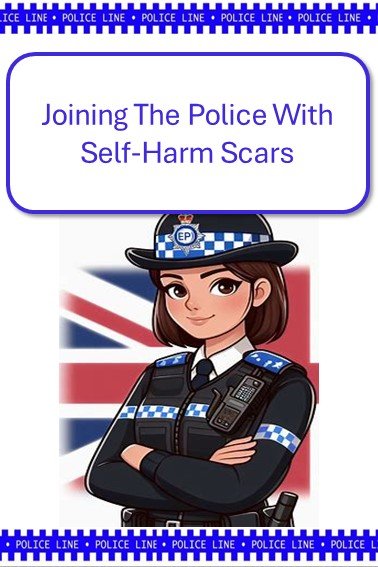If you’re considering a career in the police, it’s natural to have questions about the requirements for joining. One common concern is whether or not visible self-harm scars would disqualify an applicant from becoming a police officer in the UK. Read on and we will take you through whether it’s possible to join the police with self harm scars.
- Understanding The UK Police Recruitment Process
- The Role Of Fitness Standards In Joining The Police
- Mental Health Considerations For Police Applicants
- Addressing Self-Harm Scars In The Recruitment Process
- Breaking Down Stigma And Misconceptions
- Importance Of Diversity And Inclusion In Policing
- Wrapping Up: Can I Join The Uk Police With Self Harm Scars?
Firstly, if you are asking the question of whether it’s possible to join the police with self harm scars, I’m sorry that you’ve ever found yourself in that position.
However, it’s a testament to your character that you’re considering a career in policing, to help others, and you have so many life experiences to offer.

Let’s get into it.
While there are strict fitness and vetting standards that all applicants must meet, having self-harm scars does not automatically rule someone out from joining the police force.
However, there may be additional consideration given to an individual’s mental health history during the recruitment process.

In this article, we’ll explore what factors come into play when assessing an applicant with self-harm scars and what resources are available for those who need support throughout their policing careers.
Understanding The UK Police Recruitment Process
Are you interested in joining the UK police force but worried that your self-harm scars will affect your eligibility? The good news is that having a history of self-harm does not automatically disqualify you from becoming a police officer.
However, like any other applicant, you will need to meet certain police eligibility criteria and go through a rigorous recruitment process.
The first step in overcoming obstacles in the recruitment process is understanding what the police are looking for in their candidates.
Each police force has its own set of requirements, but some general criteria include being at least 18 years old, having a valid driving license, passing background checks and fitness tests, and demonstrating strong communication skills.
Additionally, it’s important to have a clean criminal record and be able to handle stressful situations with professionalism and composure.
By meeting these criteria and showing dedication to serving your community as a police officer, you can increase your chances of success in the recruitment process despite any past struggles with self-harm.
The Role Of Fitness Standards In Joining The Police
Imagine you are building a house. You carefully select the materials and ensure that each piece is strong and supportive, capable of withstanding any storm or challenge thrown it’s way.
The same goes for joining the police force – physical fitness requirements serve as a foundation to build upon, ensuring that officers can perform their duties effectively and safely.
Physical health concerns may arise during the course of an officer’s career. However, it is imperative that they possess a certain level of fitness in order to handle unpredictable situations with ease.
This includes being able to run after suspects, scale walls or fences if necessary, and engage in hand-to-hand combat should it become necessary.
While self harm scars do not necessarily impact one’s ability to meet these standards, it is important to consider whether past mental health struggles could affect an individual’s current state of mind when faced with high-pressure scenarios.
Ultimately, prioritising physical fitness ensures that officers can protect both themselves and those around them while on duty.
Mental Health Considerations For Police Applicants
While fitness standards are an important factor in joining the police, mental health considerations also play a significant role. Police work can be incredibly stressful and emotionally demanding, which means that applicants must have strong mental fortitude to cope with the challenges they may face on the job.
However, this does not mean that individuals who struggle with mental health issues or have self-harm scars cannot join the police force.
The UK police force is committed to supporting applicants with mental health accommodations, including those who have previous experiences of self-harm.
While each case will be evaluated individually, having self-harm scars will not disqualify someone from becoming a police officer.
The most important thing for applicants is to disclose any relevant information about their mental health history during the recruitment process so that appropriate support can be provided if needed.
Addressing Self-Harm Scars In The Recruitment Process
Did you know that one in six people in the UK have self-harmed at some point in their life? This statistic shows just how common it is to struggle with mental health issues and engage in self-destructive behavior.
What this means is that you have experienced something that many of the people you could come into contact with as a police officer have. That means that you will have a shared experience that you may be able to draw upon in order to connect with them in their hour of need.
This invaluable experience should not be overlooked.
It can be daunting to navigate disclosure of your past struggles, but it’s essential to be honest about your experiences so that you receive appropriate support while on duty. Additionally, it’s recommended that candidates develop coping strategies for managing potential triggers while working as a police officer.
With proper support and resources available, there should be no reason why someone cannot pursue their dream career despite their past struggles with mental health.
n can continue serving their community safely and effectively.
Breaking Down Stigma And Misconceptions
As mentioned in the previous section, police officers are not immune to experiencing mental health issues. It is important for law enforcement agencies to provide resources and support systems for their officers who may be struggling with conditions such as depression, anxiety, or PTSD.
However, it’s also crucial that we continue to de stigmatise self harm and promote mental health awareness within the broader community.
Self-harm scars should never be a barrier for someone interested in joining the UK police force. Unfortunately, there is still a misconception that individuals with self harm histories cannot become effective police officers due to concerns over compromised emotional stability or potential relapses.
This belief only perpetuates harmful stereotypes and hinders progress toward creating an inclusive society where everyone can thrive.
By promoting open communication about mental health struggles and encouraging empathy towards those who have experienced them, we can create a more supportive environment for all members of law enforcement – both current and prospective.
Importance Of Diversity And Inclusion In Policing
Promoting equality is essential for the success of lpolicing, as it ensures everyone is treated fairly and given the same opportunities.
Cultivating respect within the ranks of law enforcement is also key in fostering a safe and inclusive environment.
Promoting Equality
As a society, we should encourage the acceptance of all individuals regardless of their past experiences or visible physical characteristics.
By promoting empathy and understanding within the law enforcement community, officers can better connect with the diverse communities they serve.
It is important to recognise that self-harm scars do not reflect an individual’s ability to perform their job effectively nor does it diminish their worth as a human being.
We must strive towards inclusivity in the workplace and create environments where everyone feels valued and respected for who they are.
Cultivating Respect
It’s clear that promoting acceptance and fostering empathy is key to creating inclusive environments where everyone feels valued. This is especially important in law enforcement, where officers must work with diverse communities every day.
One crucial aspect of cultivating respect in this context is recognizing the importance of diversity and inclusion within the profession itself.
By embracing officers from all backgrounds and experiences, we can encourage mutual understanding and create a stronger connection between law enforcement and the communities they serve.
To achieve this goal, it’s essential for leaders within the field to actively promote inclusivity through training programs, hiring practices, and workplace policies that foster an environment of respect and support for all members of their team.
Wrapping Up: Can I Join The Uk Police With Self Harm Scars?
In conclusion, joining the UK police force with self-harm scars is possible, but it depends on a variety of factors. The recruitment process includes fitness standards and mental health considerations that may affect your application.
However, don’t let this discourage you from pursuing a fulfilling career in law enforcement. Remember, diversity and inclusion are essential in any profession, including law enforcement.
By breaking down stigma and misconceptions surrounding mental health issues like self-harm scars, we can create an environment where all officers feel supported and valued.
As Winston Churchill once said, ‘Success is not final; failure is not fatal: It is the courage to continue that counts.’ So if you’re passionate about serving your community and making a difference as a police officer, don’t give up on your dreams just because of past struggles.
Instead, embrace them as part of who you are and use them to inspire others along the way.





